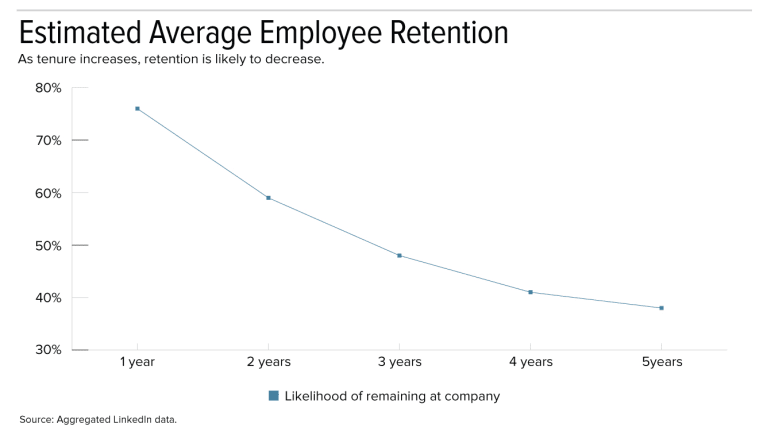Employees who move around within a company, whether to new jobs in different departments or by promotions, are more likely to stay with that company, LinkedIn data show.
A study of 32 million profiles of active LinkedIn users who've worked at a larger company (one with more than 500 employees) since 2013 found the likelihood of an employee staying with a company decreases as the years pass. One year after being hired, there's a 76 percent chance the worker will still be with the company. By year five estimated retention is down to 38 percent.
But employees who were promoted within three years of being hired have a 70 percent chance of staying onboard, and those who made a lateral move have a 62 percent chance of staying. Those who were not promoted and who did not change jobs internally have only a 45 percent chance of remaining.

"A consistent finding we've seen over many years is that engagement and people's willingness to bring their best selves to work is often strongly driven by whether they see they have a future at the organization," said Amy Lavoie, regional leader of people science at Glint, an employee engagement platform in Mountain View, Calif.
But realizing the concept of career development can sometimes be challenging for organizations, she said. "Organizations ultimately have a hierarchy and not everybody will have upward progression. People don't necessarily need a promotion to feel like they are learning and growing professionally, but everybody does need to see that they have a growth path of some kind. That might mean a lateral move, a challenging assignment or new skills training."
Managers Matter
The study also showed that companies with highly rated management teams have greater retention rates. At companies rated highly for "open and effective management," there was a 48 percent chance of employees still being on the job after three years. Retention after three years dropped to 32 percent at employers with low management scores.
"While things such as pay and benefits may be a factor, organizations clearly need to get the right leaders in place to avoid turnover," said Rick Lepsinger, recently a managing partner at OnPoint Consulting, a leadership development firm in the New York City area. "The saying 'People don't quit their jobs—they quit their bosses' is one of those rare truisms that's actually backed up by data. According to a Gallup study, a shocking 50 percent of employees admitted to leaving a job primarily to get away from a manager."
Lepsinger said that managers must be developed to improve their leadership skills in areas such as emotional intelligence, active listening, building trust and agility in adapting to change.
"It so often comes down to enabling managers to have great conversations with their employees," Lavoie said. "Asking a simple question like 'What do you want to learn next?' or 'What do you need that will help you have a bigger impact?' opens up a conversation and an awareness to start to connect at a deeper level and tap into what employees are really excited about. Sometimes it's just knowing that your manager cares."
[SHRM members-only toolkit: Developing Management]
Employee Empowerment
Employees also stay longer at organizations perceived to be places where workers have influence. After three years at one of those employers, there's a 47 percent chance of retention, while employees at companies viewed as less empowering only have a 35 percent chance of still being there after three years, according to LinkedIn.
When employees believe that they have no control over their own success, "they can quickly become disengaged—and thus more likely to look for other organizations where they have better opportunities," Lepsinger said.
To empower employees and give them a sense of control, he advised employers to clearly communicate expectations, routinely discuss future plans and provide regular feedback.
Another frequently cited complaint is lack of recognition. "When people try their best to meet tough deadlines and goals, but don't get the recognition they deserve for their efforts, they may feel they have been slighted," he said. "Immediately following the completion of an assignment or a major accomplishment, it can help to provide recognition for the employee's efforts, whether that recognition is a quick 'thank you' or a more tangible bonus. Providing such recognition for above-average efforts can help motivate others to be more productive, making this approach one of the more effective strategies for employee retention."
An organization run by AI is not a futuristic concept. Such technology is already a part of many workplaces and will continue to shape the labor market and HR. Here's how employers and employees can successfully manage generative AI and other AI-powered systems.




